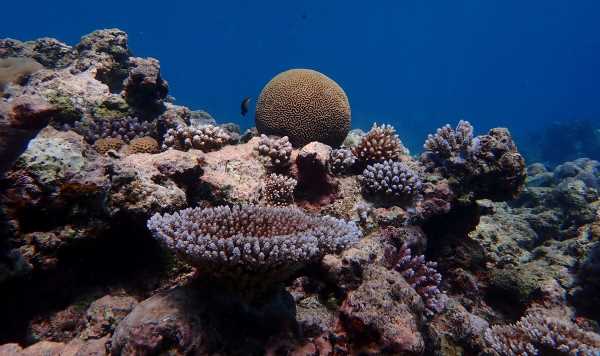Coral bleaching in Japan the worst in 20 years
Coral reefs may not be as vulnerable to climate change as previously thought – and appear to be adapting to warmer seas – a new study suggests. But scientists say their research shows that carbon emissions must still be reduced.
Reefs in one part of the Pacific Ocean have likely adjusted to higher ocean temperatures, which could reduce the future bleaching impacts of global warming, say scientists. The Newcastle University-led study focused on the Pacific Island nation of Palau and has revealed that historic increases in the thermal tolerance of coral reefs are possible.
Researchers say their findings, published in the journal Nature Communications, illustrate how the capacity could reduce future bleaching impacts if global carbon emissions are cut down. Drawing on decades of field observations, the Newcastle team modelled many possible future coral bleaching trajectories for Palauan reefs, each with a different simulated rate of thermal tolerance enhancement.
Read more… Great Barrier Reef springs back to life in stunning ‘regeneration’
They found that if coral thermal tolerance continues to rise throughout the 21st Century at the most-likely historic rate, “significant” reductions in bleaching impacts are possible. The results affirm the scientific consensus that the severity of future coral bleaching depends on carbon emissions reductions.
The researchers say that high-frequency bleaching can be fully mitigated at some reefs under low-to-middle emissions scenarios where, for example, the Paris Agreement commitments are fulfilled. But such bleaching impacts are unavoidable under high emissions scenarios where society continues to rely on fossil-fuelled development.
Study lead author Liam Lachs said: “Our study indicates the presence of an ecological resilience to climate change, yet also highlights the need to fulfil Paris Agreement commitments to effectively preserve coral reefs. We quantified a natural increase in coral thermal tolerance over decadal time scales which can be directly compared to the rate of ocean warming.”
Don’t miss…
Caravan covered in ULEZ protests chained outside Sadiq Khan house[LATEST]
Police told to investigate ‘every reasonable lead’ to drive down crime rates[CRIME]
Four factors predict heart condition that causes strokes[HEALTH]
Mr Lachs, a Ph.D. candidate, added: “While our work offers a glimmer of hope, it also emphasises the need for continued action on reducing carbon emissions to mitigate climate change and secure a future for these vital ecosystems.”
Study co-author Dr James Guest said: “We know that coral reefs can increase their overall thermal tolerance over time by acclimatisation, genetic adaptation or shifts in community structure, however we know very little about the rates at which this is occurring. This study uses data from a remote Pacific coral reef system and estimates the rate of increase in tolerance since the late 1980s.
“The results provide some hope that reefs can keep up with increasing temperatures, but only if strong action is taken on climate change.”
The study was the result of a collaborative visit Mr Lachs undertook in 2021 to work with Professor Simon Donner’s Climate and Coastal Ecosystems Laboratory at the University of British Columbia in Canada.
We use your sign-up to provide content in ways you’ve consented to and to improve our understanding of you. This may include adverts from us and 3rd parties based on our understanding. You can unsubscribe at any time. More info
Prof Donner said: “This study shows the potential for some coral reefs to become more resilient to future climate change-fuelled heat waves. That resilience, however, can also come at a cost, in terms of reduced reef diversity and growth.
“Without sharp cuts in greenhouse gas emissions over the next two to three decades, the reefs in the Pacific won’t provide the resources and protection from waves that Pacific peoples have depended upon for centuries.”
To survive amid climate change, the researchers say coral communities need to endure progressively more intense and frequent marine heatwaves. The Newcastle team’s findings reveal that the thermal tolerance of corals in Palau has likely increased at a rate of 0.1 °C per decade since the late 1980s.
The researchers say that increase suggests that natural mechanisms, such as genetic adaptation or acclimatisation of corals or their symbiotic microalgae, could have contributed to the enhancement of coral thermal tolerance.
Study co-author Prof Peter Mumby, of the University of Queensland in Australia, added: “Some of the upcoming challenges will be to disentangle which mechanisms have driven these potential shifts in tolerance, and to understand the possibility of continued future increases in thermal tolerance.”
Source: Read Full Article

